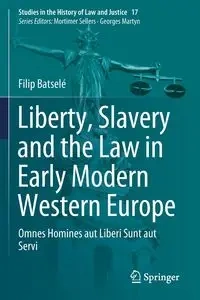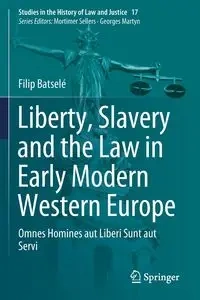Liberty, Slavery and the Law in Early Modern Western Europe - Filip Batselé
Liberty, Slavery and the Law in Early Modern Western Europe - Filip Batselé
- Omnes Homines aut Liberi Sunt aut Servi
AutorzyFilip Batselé
This book investigates the legal evolution of the "free soil principle" in England, France and the Low Countries during the Early Modern period (ca. 1500-1800), which essentially stated that, as soon as slaves entered a certain country, they would immediately gain their freedom. This book synthesizes the existing literature on the origins and evolution of the principle, adds new insights by drawing on previously undiscussed primary sources on the development of free soil in the Low Countries and employs a pan-Western, European and comparative approach to identify and explain the differences and similarities in the application of this principle in France, England and the Low Countries.
Divided into four sections, the book begins with a brief introduction to the subject matter, putting it in its historical context. Slavery is legally defined, using the established international law definition, and both the status of slavery in Europe before the Early Modern Period and the Atlantic slave trade are discussed. Secondly, the book assesses the legal origins of the free soil principle in England, France and the Low Countries during the period 1500-1650 and discusses the legal repercussions of slaves coming to England, France and the Low Countries from other countries, where the institution was legally recognized. Thirdly, it addresses the further development of the free soil principle during the period 1650-1800. In the fourth and last section, the book uses the insights gained to provide a pan-Western, European and comparative perspective on the origins and application of the free soil principle in Western Europe. In this regard, it compares the origins of free soil for the respective countries discussed, as well as its application during the heyday of the Atlantic slave trade. This perspective makes it possible to explain some of the divergences in approaches between the countries examined and represents the first-ever full-scale country comparison on this subject in a book.
EAN: 9783030368579
Marka
Symbol
191HHR03527KS
Rok wydania
2021
Strony
240
Oprawa
Miekka
Format
15.6x23.4cm
Język
angielski

Bez ryzyka
14 dni na łatwy zwrot

Szeroki asortyment
ponad milion pozycji

Niskie ceny i rabaty
nawet do 50% każdego dnia
Niepotwierdzona zakupem
Ocena: /5
Marka
Symbol
191HHR03527KS
Kod producenta
9783030368579
Rok wydania
2021
Strony
240
Oprawa
Miekka
Format
15.6x23.4cm
Język
angielski
Autorzy
Filip Batselé

This book investigates the legal evolution of the "free soil principle" in England, France and the Low Countries during the Early Modern period (ca. 1500-1800), which essentially stated that, as soon as slaves entered a certain country, they would immediately gain their freedom. This book synthesizes the existing literature on the origins and evolution of the principle, adds new insights by drawing on previously undiscussed primary sources on the development of free soil in the Low Countries and employs a pan-Western, European and comparative approach to identify and explain the differences and similarities in the application of this principle in France, England and the Low Countries.
Divided into four sections, the book begins with a brief introduction to the subject matter, putting it in its historical context. Slavery is legally defined, using the established international law definition, and both the status of slavery in Europe before the Early Modern Period and the Atlantic slave trade are discussed. Secondly, the book assesses the legal origins of the free soil principle in England, France and the Low Countries during the period 1500-1650 and discusses the legal repercussions of slaves coming to England, France and the Low Countries from other countries, where the institution was legally recognized. Thirdly, it addresses the further development of the free soil principle during the period 1650-1800. In the fourth and last section, the book uses the insights gained to provide a pan-Western, European and comparative perspective on the origins and application of the free soil principle in Western Europe. In this regard, it compares the origins of free soil for the respective countries discussed, as well as its application during the heyday of the Atlantic slave trade. This perspective makes it possible to explain some of the divergences in approaches between the countries examined and represents the first-ever full-scale country comparison on this subject in a book.
EAN: 9783030368579
Niepotwierdzona zakupem
Ocena: /5
Zapytaj o produkt
Niepotwierdzona zakupem
Ocena: /5
Napisz swoją opinię

